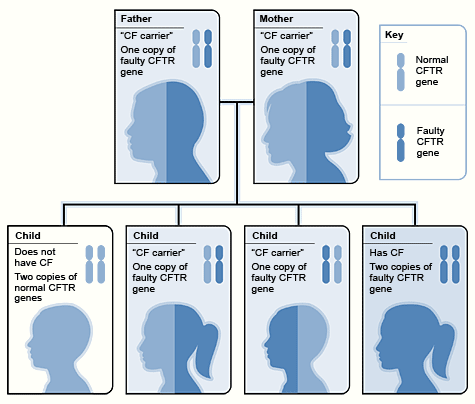What Causes Cystic Fibrosis?
A defect in the CFTR gene causes cystic fibrosis (CF). This gene makes a protein that controls the movement of salt and water in and out of your body's cells. In people who have CF, the gene makes a protein that doesn't work well. This causes thick, sticky mucus and very salty sweat.
Research suggests that the CFTR protein also affects the body in other ways. This may help explain other symptoms and complications of CF.
More than a thousand known defects can affect the CFTR gene. The type of defect you or your child has may affect the severity of CF. Other genes also may play a role in the severity of the disease.
How Is Cystic Fibrosis Inherited?
Every person inherits two CFTR genes—one from each parent. Children who inherit a faulty CFTR gene from each parent will have CF.
Children who inherit one faulty CFTR gene and one normal CFTR gene are "CF carriers." CF carriers usually have no symptoms of CF and live normal lives. However, they can pass the faulty CFTR gene to their children.
The image below shows how two parents who are both CF carriers can pass the faulty CFTR gene to their children.
Example of an Inheritance Pattern for Cystic Fibrosis

The image shows how CFTR genes are inherited. A person inherits two copies of the CFTR gene—one from each parent. If each parent has a normal CFTR gene and a faulty CFTR gene, each child has a 25 percent chance of inheriting two normal genes; a 50 percent chance of inheriting one normal gene and one faulty gene; and a 25 percent chance of inheriting two faulty genes.
Clinical trials are research studies that explore whether a medical strategy, treatment, or device is safe and effective for humans. To find clinical trials that are currently underway for Cystic Fibrosis, visit www.clinicaltrials.gov.
![]()
Visit Children and Clinical Studies to hear experts, parents, and children talk about their experiences with clinical research
May 20, 2012
Concentrated saline therapy not effective in young children with cystic fibrosis
Inhaling concentrated saline (salt water) mist does not reduce how often infants and young children with cystic fibrosis (CF) need antibiotics for respiratory symptoms, according to findings from a clinical trial sponsored by the National Heart, Lung, and Blood Institute (NHLBI), part of the National Institutes of Health.
The NHLBI updates Health Topics articles on a biennial cycle based on a thorough review of research findings and new literature. The articles also are updated as needed if important new research is published. The date on each Health Topics article reflects when the content was originally posted or last revised.
















